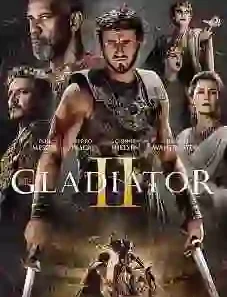
Gladiator II (2024) – Complete Review – Zvideo
Gladiator II (2024) is one of the most highly anticipated films in recent years, serving as the long-awaited sequel to the 2000 blockbuster Gladiator. Directed once again by Ridley Scott, the film continues the journey of the Roman Empire, delving into the world of political intrigue, power struggles, and epic battles. This time, however, the focus shifts to a new protagonist, Lucius, the young boy from the original movie, who has grown up in the shadows of the mighty empire and is now forced to confront the brutal realities of Roman society once more.
Overview of Gladiator II (2024)
Genres: Action, Adventure, Drama
Director: Ridley Scott
Writers: David Scarpa, Peter Craig, David Franzoni
Stars: Connie Nielsen, Paul Mescal, Pedro Pascal
Plot Summary
The story of Gladiator II (2024) takes place years after the events of the original movie. After fleeing the violence and chaos of Rome as a young boy, Lucius (played by Paul Mescal) has grown up in the relative peace of Africa. However, his life is torn apart once again when Marcus Acacius (Pedro Pascal), a ruthless general, arrives with a large fleet and an even larger army, laying siege to the African city where Lucius has lived.
In the chaos of the siege, Acacius captures all the males, including Lucius, and brings them back to Rome as slaves. From this point forward, Lucius is thrust into the heart of a city ruled by two corrupt emperors, who are widely hated by the populace. These emperors are not merely weak leaders; they are grotesque in their excess and vanity, seemingly more concerned with their personal appearance (evidenced by their penchant for wearing makeup in a style reminiscent of housewives) than the well-being of the empire they rule.
Lucius is handed over to Macrinus (Connie Nielsen), a merciless slave owner and trainer, who puts him to work in the gladiatorial games. It is here that the sense of déjà vu sets in for Lucius, as he finds himself once again in the brutal world of combat and bloodshed. However, as he trains to become a gladiator, a shift begins to stir in the empire.
Acacius, who once sought to strengthen his position through force, now plans to overthrow the twin emperors using his own military might. Meanwhile, Macrinus is plotting a more cunning and political revolution that seeks to manipulate the emperors’ vanity and weaknesses, ultimately replacing them with a new order. Lucius, caught between the ambitions of these two power-hungry figures, must navigate the treacherous landscape of Rome’s politics and its bloodthirsty arena to find his path to freedom and vengeance.
Characters and Performances
Lucius (Paul Mescal)
Lucius, now an adult, is the emotional heart of Gladiator II. Played by Paul Mescal, Lucius’s character represents the journey from innocence to experience. Mescal delivers a powerful performance as a man who has been shaped by trauma and conflict but is still driven by a desire for justice. His portrayal of Lucius reflects the character’s internal struggle, torn between revenge and redemption, loyalty and betrayal. As a gladiator, Lucius has to not only confront his physical limitations but also grapple with his sense of identity as a former nobleman now reduced to a slave.
Marcus Acacius (Pedro Pascal)
Pedro Pascal’s portrayal of Marcus Acacius adds a layer of complexity to the character. Initially, Acacius is a formidable general, a man of war whose sole focus is on military conquest. However, as the story progresses, we learn of his deeper motivations: a desire to reshape Rome and remove the corrupt emperors who now sit at the top of the empire. Pascal brings a sense of charisma and cunning to Acacius, making him a compelling figure whose ambition knows no bounds.
Macrinus (Connie Nielsen)
Connie Nielsen’s return to the Gladiator franchise as Macrinus is one of the standout performances of the film. As a ruthless and calculating slave owner, Macrinus serves as the key antagonist in Lucius’s journey. She is cold, manipulative, and fiercely intelligent, using her position to orchestrate a political revolution from within. Nielsen’s portrayal of Macrinus is both chilling and magnetic, as she balances the character’s cruelty with a sense of strategic foresight.
The Twin Emperors
The twin emperors, whose identities are shrouded in mystery for much of the film, are portrayed as decadent and narcissistic figures. Their obsession with their own appearance and their indulgence in excessive behaviors make them unsympathetic characters who are ripe for overthrow. The filmmakers subtly criticize the excesses of power, illustrating how their vanity undermines their authority and contributes to their downfall. Their portrayal adds a layer of satire to the film, highlighting the absurdity of their rule.
Themes in Gladiator II (2024)
Revenge and Redemption
One of the central themes of Gladiator II is the dual concept of revenge and redemption. Lucius’s return to Rome, as both a slave and a gladiator, is driven by a need for vengeance against the empire that once took everything from him. However, as the story unfolds, Lucius also seeks redemption – not only for his own past but for the broken world of Rome itself. This internal conflict forms the emotional core of the film, as Lucius struggles with his desire for revenge and the understanding that his actions may perpetuate the cycle of violence and suffering.
Corruption and Power
The film’s portrayal of the Roman Empire is one of corruption and excess. The twin emperors, with their obsession over their appearance and the indulgence of their own vanity, embody the worst aspects of power. Their reign is characterized by a lack of true leadership, which has led the empire into decay. Acacius’s military coup and Macrinus’s political revolution are both responses to this corruption, each presenting different ways of seizing power. The film critiques the notion of absolute power, suggesting that those who seek it are often the least fit to wield it.
Identity and Transformation
Lucius’s journey is also one of self-discovery. As he moves from a peaceful existence in Africa to being thrust back into the bloodied world of Rome, he must grapple with his identity. Once a nobleman, now a gladiator and slave, Lucius’s transformation reflects the brutal nature of the empire and the way it shapes those who come into contact with it. His struggle to reconcile his past with his present is a powerful narrative arc that mirrors the broader themes of empire and the cost of living under its rule.
The Price of Freedom
Freedom is another key theme in Gladiator II. Lucius is initially imprisoned by his circumstances, forced to fight in the arena as a slave. However, his quest for freedom becomes intertwined with his desire for justice. The film asks important questions about what freedom truly means in a society built on power, violence, and oppression. For Lucius, freedom is not simply physical – it’s also a moral and emotional journey, one that requires him to confront the darkness within himself and his world.
Cinematic Techniques and Direction
Ridley Scott’s direction in Gladiator II remains as visually stunning and engaging as in the original film. Scott continues to use sweeping, epic shots that capture the grandeur and brutality of the Roman Empire, from the sprawling streets of Rome to the blood-soaked sands of the gladiatorial arena. The film’s action sequences are intense and visceral, with the gladiatorial combat being particularly brutal and well-choreographed. The cinematography highlights the contrast between the opulence of the emperor’s palace and the grim realities of the gladiatorial pits.
Scott’s direction also masterfully intertwines the political and personal aspects of the story. While the action is a central component of the film, the interpersonal relationships and the political intrigue never take a backseat. This balance ensures that the stakes are always high, both for the characters and for the empire itself.
Conclusion
Gladiator II is an ambitious and thrilling sequel that successfully expands the story of the original film while introducing new characters, themes, and conflicts. With its focus on the aftermath of the Roman Empire, the power struggles at its heart, and a complex new protagonist in Lucius, the film takes the franchise in exciting new directions. Ridley Scott once again delivers an epic tale of action, politics, and personal transformation that is sure to captivate audiences.
Whether or not Gladiator II lives up to the original remains to be seen, but the film undeniably sets the stage for more gripping stories within the Roman Empire. With Lucius’s journey still ongoing and the fate of the empire hanging in the balance, Gladiator II leaves viewers eagerly anticipating what comes next.







